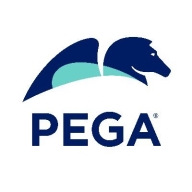

Pega Platform and Hyland OnBase contend within enterprise solutions, with Pega often emerging as superior due to its advanced features and flexibility, while Hyland is praised for stability and enterprise content management capabilities.
Features: Pega Platform offers rapid prototyping, case management, and decision-making support. Its low-code architecture facilitates quick adaptation and business process visualization. Pega Cloud provides seamless development and deployment. Hyland OnBase excels in robust indexing, document security, and integration with systems like Salesforce. Its intuitive interface enhances comprehensive content management.
Room for Improvement: Pega Platform could enhance UI, streamline upgrade paths, and improve AI/ML integration. Users seek more affordable licensing and a stronger cloud presence. Hyland OnBase would benefit from better dashboard capabilities, an improved user experience, and expanded BPM support. Streamlined user interfaces and better regional pricing are also desired improvements for OnBase.
Ease of Deployment and Customer Service: Pega provides flexible deployment options across on-premises, public, private, and hybrid clouds, though setup complexity varies. Its technical support receives mixed feedback. Hyland OnBase supports primarily on-premises deployments with praised modular upgrades and consistent technical support, albeit sometimes slow.
Pricing and ROI: Pega’s pricing is high, particularly for smaller enterprises, yet ROI is seen as strong due to improved efficiency. Licensing models can be complex. Hyland OnBase is also considered pricey but valuable, offering modular solutions. Regional pricing variations may present cost barriers, but both platforms promise significant gains through efficiencies.


Hyland OnBase is acclaimed for its robust document management, automating workflows, and improving organizational efficiency across various industries. Praised for its ability to manage records compliantly, especially in regulated sectors like healthcare and finance, the tool also integrates smoothly with other enterprise systems. Users benefit significantly from streamlined processes, reduced manual tasks, and enhanced data accuracy, boosting productivity and customer satisfaction.
Pega Platform facilitates business process management, case management, and workflow automation for industries like banking, insurance, and healthcare. It supports digital transformation and customer service enhancements with its low-code capabilities and seamless integrations.
Pega Platform enables users to create efficient systems for case management, financial operations, and digital transformations. It provides tools for client onboarding, quoting, claims processing, customer experience improvements, and content management. Pega's low-code approach allows for the automation of complex processes, making it suitable for enterprises looking for adaptability and rapid deployment. While it offers strong real-time analytics and decision automation, users acknowledge challenges in user interface, integration, and performance aspects. High costs and a learning curve need attention, and enhancements in AI features and cloud services are desired.
What are the key features of Pega Platform?In banking, Pega Platform automates loan processing, accelerates customer onboarding, and manages compliance. Insurance companies benefit from streamlined claims processing and policy management. Healthcare sectors use the platform for patient engagement and care coordination, enabling organizations to adapt quickly to changing industry requirements.
We monitor all Business Process Management (BPM) reviews to prevent fraudulent reviews and keep review quality high. We do not post reviews by company employees or direct competitors. We validate each review for authenticity via cross-reference with LinkedIn, and personal follow-up with the reviewer when necessary.